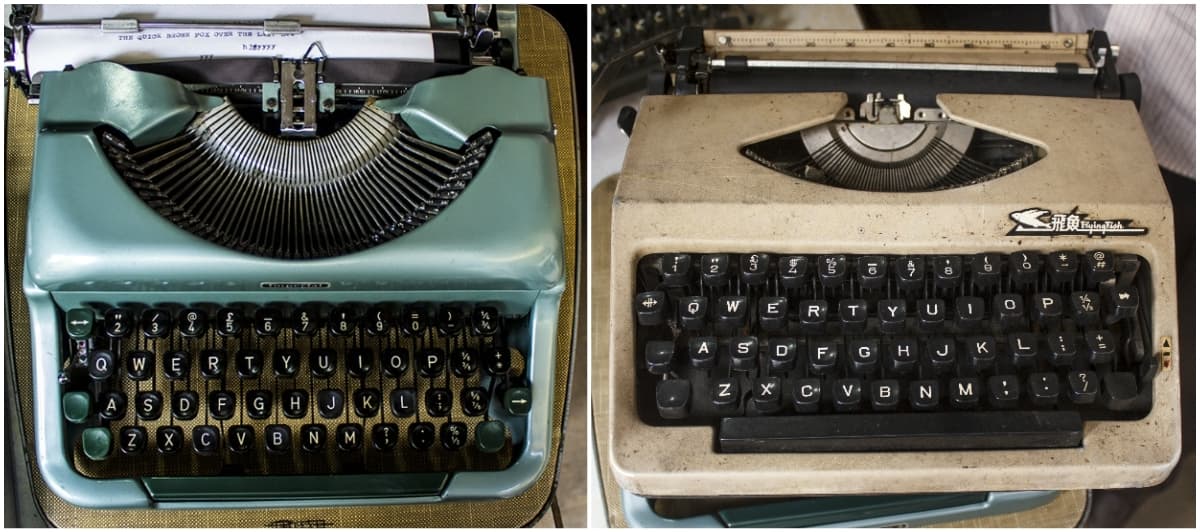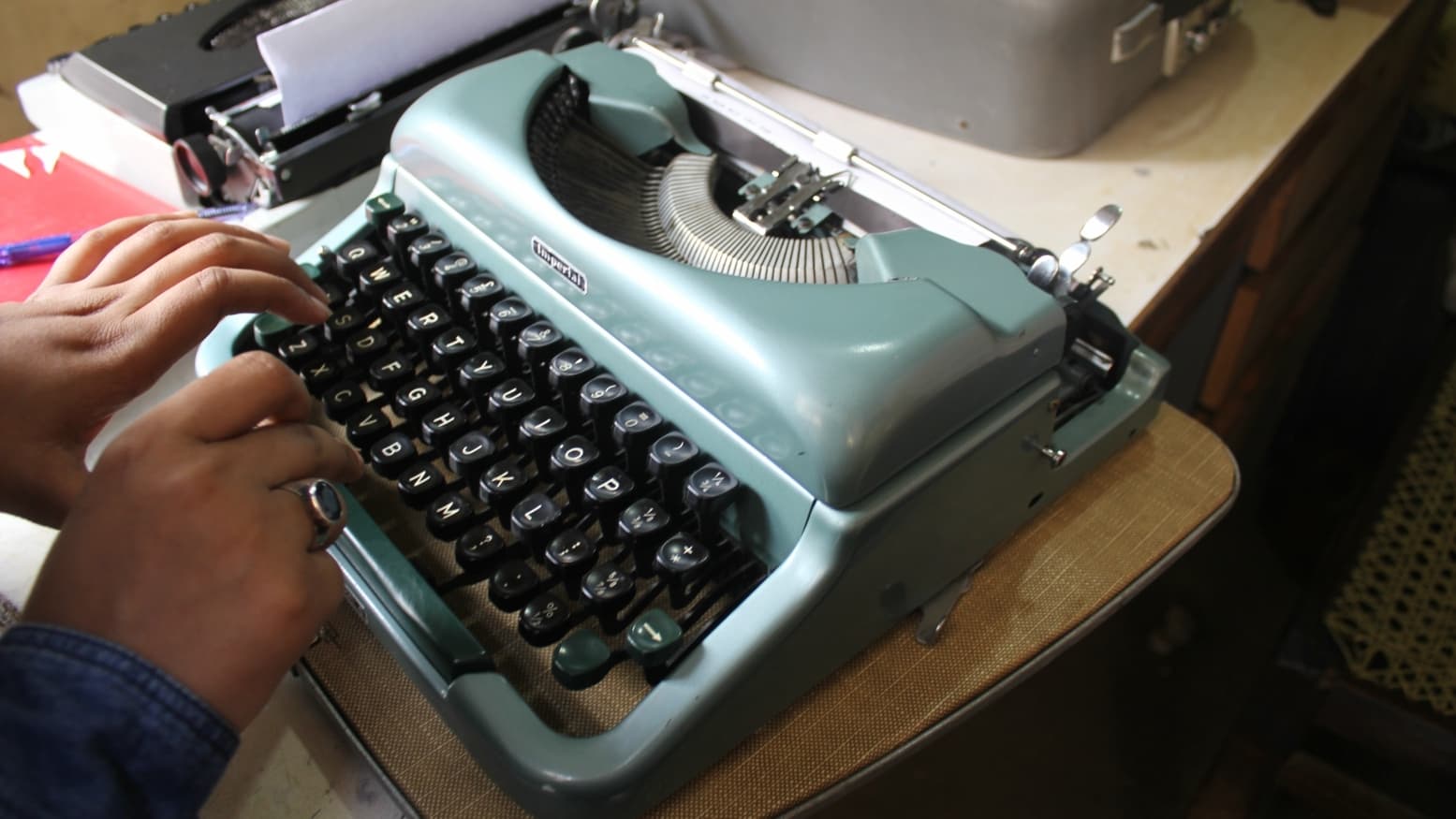Throwback: How my quest for a typewriter in Karachi revived a love for all things retro

When I was reading Ernest Hemingway, I came across his famous quote: ''There is nothing to writing. All you do is sit down at a typewriter and bleed.'' I resolved to follow in his footsteps, to get myself a typewriter and see whether putting one to the test would help me reawaken a muse enjoying a deep slumber.
But it turned out that earnestly following Ernest can be quite challenging, as I searched high and low for a decent typewriter with barely any leads. I soon realised that my yearning for a typewriter exposed me for the retro-kitsch loving collector that I truly am.

While people around me would save money to buy better phones, I'd do the same to buy a Polaroid or vinyl records. My friends shook their heads but eventually surprised me by actually getting me one on my birthday.
Wannabe typist? That's me
For those who've never used a typewriter before, be warned: it's not like typing on a laptop. A typewriter demands force. Unlike a computer keyboard or a smartphone, where you tap gently to produce a word, a typewriter's keys are meant to be hit with full force.

But once I was a pro, I would be typing those oh-so-deep quotes about life as well as ghazals and couplets for anyone whose eyes sparkled when I told them I owned one. I tried to type in the dead of night to empathise with Jack Torrance in The Shining except instead of hearing ''Here's Johnny'' I would often hear ''Here's Ammi'' (it's quite noisy, as I'm sure you've gleaned by now).
But two years in, I realised that I was quite neglectful of my machine and that's when I tried to locate the shop from where it was bought.
The hunt for a typewriter seller begins
Following the address on a card, I along with an equally excited friend went to find the shop where my machine could be repaired - a shop called Fine Office Machine.
It was located in Karachi's bustling Frere Market on Akbar Road, an area which once used to be a hub for writers and journalists. A nearby building had once served as an office for a journalists' union. Printing presses also used to be located here.
It's advisable to park the car a little ways away and walk to the market. Once in it wasn't very difficult to spot the tiny shop with a broken wooden board affirming that the shop definitely dealt with typewriters.
The man who had guided us through, Javaid, ushered us in and we sat inside the shop careful not to step on the dried pool of black and red ribbon and broken typewriters.
Javaid, who was intrigued by my knowledge of typewriters, was quite restless to find out how I was able to hear about his shop and so I narrated my tale, glossing over how I'd neglected to service my machine because his father who owned the shop is known to get upset when he finds a machine ignored.
Javaid on the other hand is more flexible, perhaps because he too belongs to the age which saw vast technological evolution.
Type-volution
Speaking about the fate of typewriters now, Javaid admitted that the near ubiquity of laptops, tablets and smart phones will soon make even PCs obsolete, so it's a blessing to see an antique typewriter in a mint condition:
"In a city like Karachi, personal computers are readily available but there are still many institutes in Sindh where children are taught to type via typewriters, and these places buy around five to six machines. Apart from that once in a blue moon, enthusiasts buy an antique piece if it catches their eye," he tells me.
The shop Fine Office Machine was opened in 1992 by Javaid's father Bahroze Khan and Javaid himself has only been associated with it for the last eight years.
"We have been running the shop for the past two decades and even today there are a few offices which keep a typewriter handy because in a way it is instant. Sometimes lawyers also buy machines from us because courtrooms also have typists," he elaborates.
"But I get amused by those who say that they want a typewriter just to show the younger lot that they existed and functioned like laptops do," he laughs.
Exploring the few machines on display, Javaid points out to us that the price of a typewriter varies with its condition and age. Generally, the older the typewriter, the higher its price. However if an antique piece is in a shabby state it might not be too costly.
A typewriter made in Japan, considerably modern, can be purchased for Rs2000 whereas a metallic green one (which also goes ting) can be bought for Rs6000. Another one sans cover can go as low as Rs1200 but then without cover, a typewriter is exposed to more dust which slashes its longevity.
While these ones are for A4 papers or sizes a little bigger, machines with huge headers were typically designed for users who had to type many letters so many papers can be attached simultaneously.
Gauging the age of a typewriter can be a bit difficult but a detail-oriented eye can catch a clue or two.
For instance, my typewriter has a 'Made In East Germany' label so it clearly means it's from the time when Germany wasn't one unit.
Handle with care — looking after your typewriter
Javaid reveals the best way to take care of a typewriter:
"You need to clean it with kerosene and make sure that the keys are well oiled. Apart from that, it can always be brought in for maintenance every two to six months. I teach people how to fix minute things as well like changing the ribbon," explains Javaid.
As he says this, he shows me how a tiny spring can halt the entire machine because without that spring the ribbon cannot budge. The ribbon, which is available in red or black, functions as ink: the key hits the ribbon to print the letters onto the page.
"Red ink is seldom seen now as it is outdated but it can be ordered from abroad. It's better to use nylon ribbon in lieu of cotton because cotton is weaker," he says.
According to Javaid, there are two to three shops in Karachi dealing with typewriters and all happen to be in Saddar near Alpha Corporation. One popular shop in the main Saddar market also attracts many potential buyers but Javaid feels they sell the machines at a higher cost and rightly so because of the exterior and interior of their shop: "They have a fancy shop. When you deal in a shop worth crores you're bound to buy the machine at twice its rate. People don't know of Frere Market anymore because it is hidden in the corner of the city."
Availability of the machine today
Although not extinct, brand-new typewriters are not easy to find because they are not being made in many countries, shares Javaid.
"In foreign countries, they don’t have a high regard for these machines and they actually throw them away in their garbage after using them — those machines then make their way to us. At Shershah, the famous scrap market in Karachi, the items will be sold at dirt cheap rates; they would sell the piece for Rs500-1000," he says.
"We are not getting new pieces as of now but Mexico is producing new typewriters. Those who have their connections, they quote us a price after which we can buy the machine in bulk," he adds.
When typewriters were not mere showpieces
"There was a time when the sales wouldn’t halt, for at least a decade this was the situation," reminisces Javaid who heard of these tales from his father.
Now the situation is drastically different.
"My father has been in this profession for the last 30-40 years so many come through his name and we sell one or two typewriters each month," he shares.
But Javaid sheepishly tells that his shop still turns a profit by repairing broken printers and scanners, two devices which are a necessity in our times.
As we exit the shop promising to return with my ailing typewriter, we being millennials ask if there is any room for bargaining but Javaid laughs and tells us the machine available today might be gone tomorrow. So much for being retrosexual, I vow to save up and buy the gleaming metallic green one because here today, gone tomorrow.